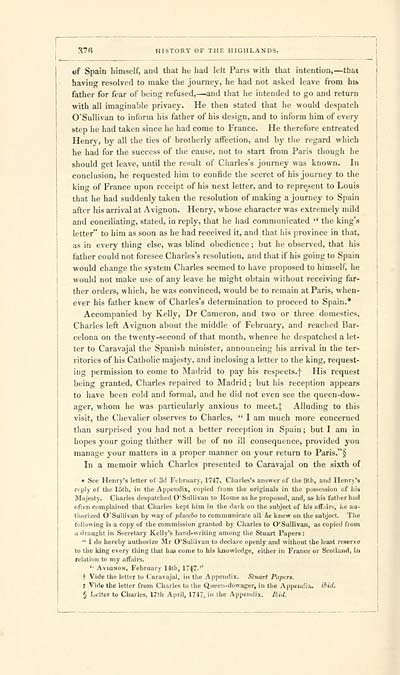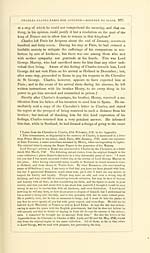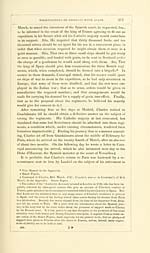Download files
Complete book:
Individual page:
Thumbnail gallery: Grid view | List view

37fi HISTORY OF THE HIGHLANDS.
of Spain himself, and that he had lelt Pans with that intention, — that
having resolved to make the journey, he had not asked leave from ht&
father for fear of being refused, — and that he intended to go and return
with all imaginable privacy. He then stated that he would despatch
O'Sullivan to inform his father of his design, and to inform him of every
step he had taken since he had come to France. He therefore entreated
Henry, by all the tics of brotherly affection, and by the regard which
he had for tlie success of the cause, not to start from Paris though he
should get leave, until the result of Charles's journey was known. In
conclusion, he requested him to confide the secret of his journey to the
king of France upon receipt of his next letter, and to represent to Louis
that he had suddenly taken the resolution of making a journey to Spain
after his arrival at Avignon. Henry, whose character was extremely mild
and conciliating, stated, in reply, that he had communicated " the king's
letter" to him as soon as he had received it, and that his province in that,
as in every thing else, was blind obedience ; but he observed, that his
father could not foresee Charles's resolution, and that if his going to Spain
would change the sj'stem Charles seemed to have proposed to himself, he
would not make use of any leave he might obtain without receiving far-
ther orders, which, he was convinced, would be to remain at Paris, when-
ever his father knew of Charles's determination to proceed to Spain.*
Accompanied by Kelly, Dr Cameion, and two or thiee domestics,
Charles left Avignon about the middle of February, and readied Bar-
celona on the twenty-second of that month, whence he despatched a let-
ter to Caravajal the Spanish minister, announcing his arrival in the ter-
ritories of his Catholic majesty, and inclosing a letter to tlie king, request-
ing permission to come to Madrid to pay his respects.f His request
being granted, Charles repaired to Madrid; but his reception appears
to have been cold and formal, and he did not even see the queen-dow-
ager, whom he was particularly anxious to meet.}: Alluding to this
visit, the Chevalier observes to Cliarles, " I am much more concerned
than surprised you had not a better reception in Spain ; but I am in
hopes your going thither will be of no ill consequence, provided you
manage your matters in a proper manner on your return to Paris."§
In a memoir which Charles presented to Caravajal on the sixth of
• See Henry's leUer of 3d pL-hruary, ]7i7, Charles's answer of tlie 91h, and Hcnr\'s
reply of the 15lh, in the Appendix, copied from the originals in the possession of his
Majesty. Charles despatched O'Sullivan to Home as he proposed, and, as his father had
oflen complaiTied that Charles kept him in the dark on the subject of his aff.dr!.. iic au-
tliorized O'Sullivan by "ay of placebo to communicate all he knew on the subjoi't. The
following is a copy of the commission granted by Cliarles to O'Sullivan, as copied fiom
a draught in Secretary Kelly's hand-writing among the Stuart Papers:
" 1 do hereby authorize iMr O'Sullivan to declare operdy and without the least reserve
to the king every thing tliat has come to his kjiowiwige, either in France oi' Scotland, in
relation to my aifairs.
'■ Avignon, February 14tli, 1717.''
f Vide the letter to Caravajal, in the Appendix. Stuart Ptiprrg.
t Vide the letter from Charles to the Queen-dowager, in the Appeiii!;.\. 'I'ul.
§ Letter to Charles, 17th April, 1747, in the Appendix. JLiil.
of Spain himself, and that he had lelt Pans with that intention, — that
having resolved to make the journey, he had not asked leave from ht&
father for fear of being refused, — and that he intended to go and return
with all imaginable privacy. He then stated that he would despatch
O'Sullivan to inform his father of his design, and to inform him of every
step he had taken since he had come to France. He therefore entreated
Henry, by all the tics of brotherly affection, and by the regard which
he had for tlie success of the cause, not to start from Paris though he
should get leave, until the result of Charles's journey was known. In
conclusion, he requested him to confide the secret of his journey to the
king of France upon receipt of his next letter, and to represent to Louis
that he had suddenly taken the resolution of making a journey to Spain
after his arrival at Avignon. Henry, whose character was extremely mild
and conciliating, stated, in reply, that he had communicated " the king's
letter" to him as soon as he had received it, and that his province in that,
as in every thing else, was blind obedience ; but he observed, that his
father could not foresee Charles's resolution, and that if his going to Spain
would change the sj'stem Charles seemed to have proposed to himself, he
would not make use of any leave he might obtain without receiving far-
ther orders, which, he was convinced, would be to remain at Paris, when-
ever his father knew of Charles's determination to proceed to Spain.*
Accompanied by Kelly, Dr Cameion, and two or thiee domestics,
Charles left Avignon about the middle of February, and readied Bar-
celona on the twenty-second of that month, whence he despatched a let-
ter to Caravajal the Spanish minister, announcing his arrival in the ter-
ritories of his Catholic majesty, and inclosing a letter to tlie king, request-
ing permission to come to Madrid to pay his respects.f His request
being granted, Charles repaired to Madrid; but his reception appears
to have been cold and formal, and he did not even see the queen-dow-
ager, whom he was particularly anxious to meet.}: Alluding to this
visit, the Chevalier observes to Cliarles, " I am much more concerned
than surprised you had not a better reception in Spain ; but I am in
hopes your going thither will be of no ill consequence, provided you
manage your matters in a proper manner on your return to Paris."§
In a memoir which Charles presented to Caravajal on the sixth of
• See Henry's leUer of 3d pL-hruary, ]7i7, Charles's answer of tlie 91h, and Hcnr\'s
reply of the 15lh, in the Appendix, copied from the originals in the possession of his
Majesty. Charles despatched O'Sullivan to Home as he proposed, and, as his father had
oflen complaiTied that Charles kept him in the dark on the subject of his aff.dr!.. iic au-
tliorized O'Sullivan by "ay of placebo to communicate all he knew on the subjoi't. The
following is a copy of the commission granted by Cliarles to O'Sullivan, as copied fiom
a draught in Secretary Kelly's hand-writing among the Stuart Papers:
" 1 do hereby authorize iMr O'Sullivan to declare operdy and without the least reserve
to the king every thing tliat has come to his kjiowiwige, either in France oi' Scotland, in
relation to my aifairs.
'■ Avignon, February 14tli, 1717.''
f Vide the letter to Caravajal, in the Appendix. Stuart Ptiprrg.
t Vide the letter from Charles to the Queen-dowager, in the Appeiii!;.\. 'I'ul.
§ Letter to Charles, 17th April, 1747, in the Appendix. JLiil.
Set display mode to: Large image | Transcription
Images and transcriptions on this page, including medium image downloads, may be used under the Creative Commons Attribution 4.0 International Licence unless otherwise stated. ![]()
| Early Gaelic Book Collections > Ossian Collection > History of the Highlands and of the Highland clans > Volume 3 > (418) |
|---|
| Permanent URL | https://digital.nls.uk/79657438 |
|---|
| Description | Vol. III. |
|---|---|
| Shelfmark | Oss.249 |
| Attribution and copyright: |
|
| Description | Selected books from the Ossian Collection of 327 volumes, originally assembled by J. Norman Methven of Perth. Different editions and translations of James MacPherson's epic poem 'Ossian', some with a map of the 'Kingdom of Connor'. Also secondary material relating to Ossianic poetry and the Ossian controversy. |
|---|
| Description | Selected items from five 'Special and Named Printed Collections'. Includes books in Gaelic and other Celtic languages, works about the Gaels, their languages, literature, culture and history. |
|---|

